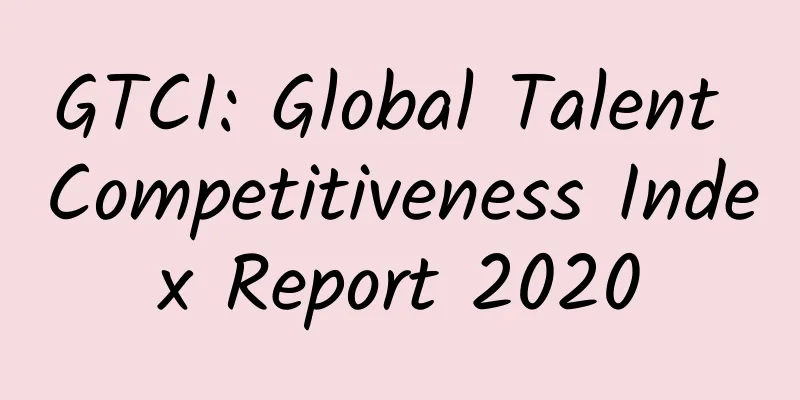GTCI: Global Talent Competitiveness Index Report 2020

|
GTCI released the "2020 Global Talent Competitiveness Index", analyzing global talent trends in the era of artificial intelligence. 1: The gap between talent-rich countries (mostly high-income countries) and the rest of the world is widening. A similar divide is also emerging in the field of artificial intelligence. AI talent is scarce and unevenly distributed across industries, sectors and countries. More than half of the population in developing countries lacks basic digital skills. 2: AI may also provide important opportunities for emerging markets to leapfrog. The GTCI’s longitudinal analysis highlights that some emerging countries (such as China, Costa Rica, and Malaysia) can become talent powerhouses in their respective regions, while others (such as Ghana and India) have significantly improved their ability to attract and retain talent. 3: Turning AI into a force for good requires a proactive, collaborative approach. AI can play a key role in providing solutions and helping humanity achieve the Sustainable Development Goals. 4: The deployment and development of AI in the workplace will require large-scale reskilling of the workforce, with workers needing training in adaptability, social intelligence, communication, and problem solving. Lifelong learning will play an increasingly important role in developing empathy, creativity, imagination, judgment, and leadership, skills that are likely to continue to be uniquely human activities. In order for humans and machines to work together effectively, developing converged skills will also require reskilling. 5: When introducing AI into businesses, communities or society at large, acceptability is a condition for sustainable development. It is also crucial to look ahead to the future of AI and jobs and emphasize the many possibilities of AI, rather than instilling more fear. 6: Cities are striving to become AI hubs and attract relevant talent. These achievements translate into different initiatives and strategies. Currently and in the future, more and more cities will become major testing areas for new AI tools, such as facial recognition, remote monitoring, and self-driving cars. The PDF version will be shared on 199IT Knowledge Planet, just scan the QR code below! |
>>: ABI Research: Research shows that 681 million 5G mobile phones will be shipped in 2022
Recommend
Eating meat and dumplings during the Spring Festival is a spiritual "partner", why do people become smelly after eating them?
When eating meat or dumplings at home during the ...
Hidden Sail Reef: How to do keyword mining in Chongqing SEO optimization?
At present, when companies conduct online promoti...
Will the electric eel shock itself when it discharges electricity?
The Amazon is a place with extremely rich biologi...
How high should the air conditioner be set?
Hot in one word! The dog days of summer have begu...
Subsidy and payment: How do products make the transition from "subsidy" to "payment"?
We found that many newly launched Internet produc...
Scientific Exploration丨China’s first major rescue: How to find an escape route for whales away from human interference?
At 5:30 in the morning of April 20, the rising su...
One-minute science popularization | Searching for the mystery of the sinking of the Titanic, which iceberg was the culprit?
What are ocean currents? Ocean currents, also kno...
iOS 16.4 push update, several new features!
Early this morning, Apple pushed the first Beta u...
I'm going to share 48 tricks to attract fans. If you don't have fans anymore, you can only blame yourself.
I'm going to share 48 tricks to attract traff...
Haofang Law School "Wang Fang's 112 Essential Ancient Poems for Primary School Students"
Course Catalog 00【Open Class】This is how you shou...
APP operation: Talk about why you shouldn’t use money to incentivize user contributions!
The important role of operations is to establish ...
From the perspective of games, what are the “routines” that can be learned to increase user stickiness?
Games and gamification activities naturally have ...
The darkest moment for the iPhone market in China in 2018
[[243895]] At the Apple autumn conference that en...
Service is an important component in Android development
Service Component 「Service」 is a component in And...









